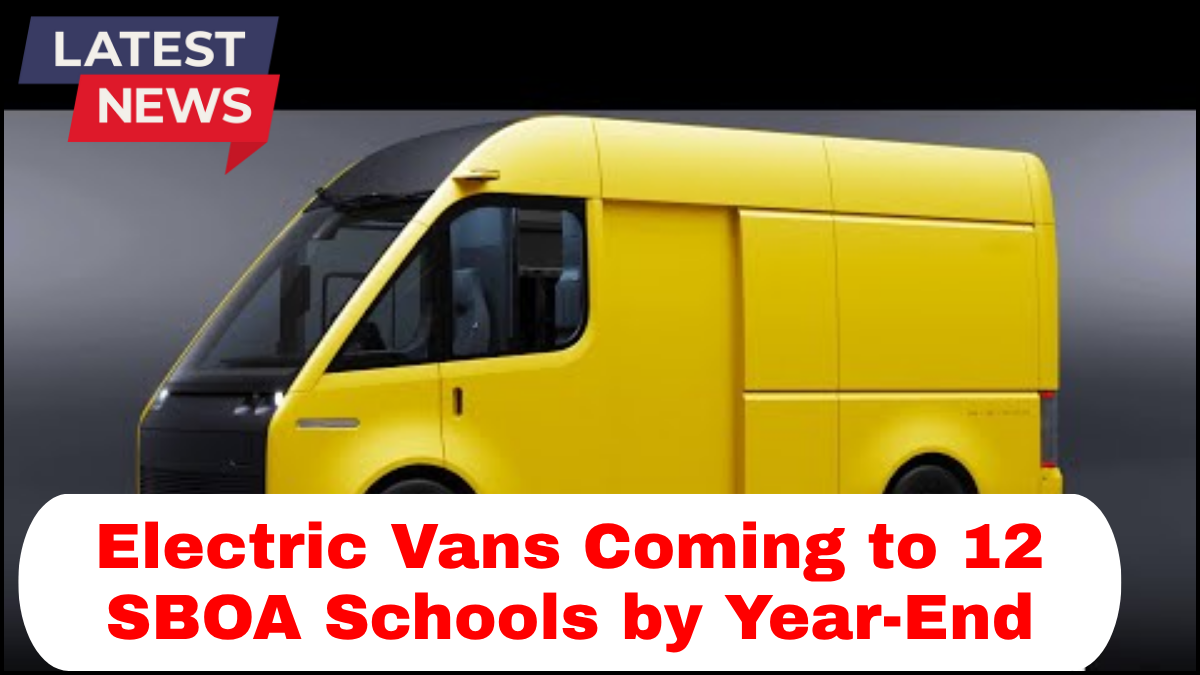The Electric School Van Initiative is gaining momentum, and the SBOA (State Board of Academics) group of schools is leading the charge toward eco-friendly school transport. By the end of this year, 12 SBOA institutions across the region are set to roll out electric vans as part of a broad sustainability initiative aimed at reducing the carbon footprint of daily school operations.
This forward-thinking transition marks a decisive shift in how educational institutions approach student mobility, energy efficiency, and environmental responsibility.

What the Electric School Van Initiative Means for SBOA
The decision to implement electric school vans is more than just a transportation upgrade—it’s a strategic move toward creating greener campuses. The Electric School Van Initiative at SBOA schools is expected to serve over 5,000 students, replacing traditional diesel and petrol vans with clean, electric alternatives.
These electric vans will come equipped with state-of-the-art lithium-ion battery systems capable of running up to 150 kilometers on a single charge. Each vehicle will also feature GPS tracking, CCTV cameras, automatic doors, and air conditioning—ensuring both safety and comfort for young passengers.
This initiative aligns with the National Electric Mobility Mission and supports state-wide policies encouraging the adoption of electric vehicles (EVs) in the public and private sectors.
Why This Shift Matters: Environmental and Economic Benefits
The transportation sector contributes significantly to urban air pollution. Traditional school vans emit a high volume of greenhouse gases and particulate matter, which affect both environmental and human health. With the eco-friendly school transport transition, SBOA schools are not just reducing emissions—they’re setting an example for others to follow.
Environmental Impact:
-
Each electric van is expected to reduce annual CO₂ emissions by 6 to 8 tons.
-
The shift will eliminate the use of over 30,000 liters of fossil fuel annually across 12 schools.
-
Noise pollution will also decrease due to the quiet operation of electric motors.
Economic Efficiency:
-
Electric vans have fewer moving parts and lower maintenance requirements.
-
Long-term operational costs are projected to be 40-50% lower compared to traditional vehicles.
-
SBOA schools plan to reinvest the savings into academic and extracurricular programs.
Charging Infrastructure and Operational Planning
To ensure seamless operation, each SBOA school will be equipped with Level 2 and Level 3 charging stations on campus. These will be solar-integrated where possible, further enhancing the schools’ commitment to sustainability.
Drivers and transport staff are undergoing specialized training to manage electric vehicles effectively, including battery management, emergency response protocols, and routine diagnostics.
A phased rollout will begin in Q3, with schools in metropolitan and tier-1 cities receiving the first fleet, followed by tier-2 locations.
Educational Impact and Student Engagement
SBOA is using this opportunity not just as a logistical upgrade but also as a learning platform. Environmental science teachers will incorporate the electric van rollout into their curriculum, using real-time data from the vehicles to teach students about carbon reduction, renewable energy, and sustainable technology.
Students will also have the chance to engage in sustainability clubs and workshops, helping build a generation that values eco-conscious living from an early age.
Looking Ahead: Scaling the Initiative
The current rollout to 12 schools is only the beginning. SBOA’s long-term goal is to transition all of its 60+ institutions to eco-friendly school transport within the next five years. The success of this pilot program will inform future decisions and possibly influence other educational bodies to follow suit.
Additionally, partnerships with electric vehicle manufacturers and clean energy providers are under negotiation to ensure technical support, maintenance coverage, and future scalability.
FAQs
Q1. What is the Electric School Van Initiative?
The Electric School Van Initiative is a program launched by SBOA schools to replace traditional school vans with electric vehicles as a step toward sustainable and eco-friendly student transportation.
Q2. How many schools are involved in the first phase?
Twelve SBOA schools are part of the initial phase, with plans to expand to all campuses in the coming years.
Q3. What are the main benefits of this transition?
The shift offers significant environmental benefits, reduced fuel costs, lower maintenance, and a safer, more comfortable ride for students.
Q4. Are charging stations being installed at all schools?
Yes, each participating SBOA school will have on-site EV charging infrastructure, with an emphasis on solar-powered systems where feasible.
Q5. Will this impact school fees?
According to SBOA administrators, the initiative is designed to be cost-neutral over time due to reduced operational expenses, and no immediate fee hikes are planned.
click here to learn more